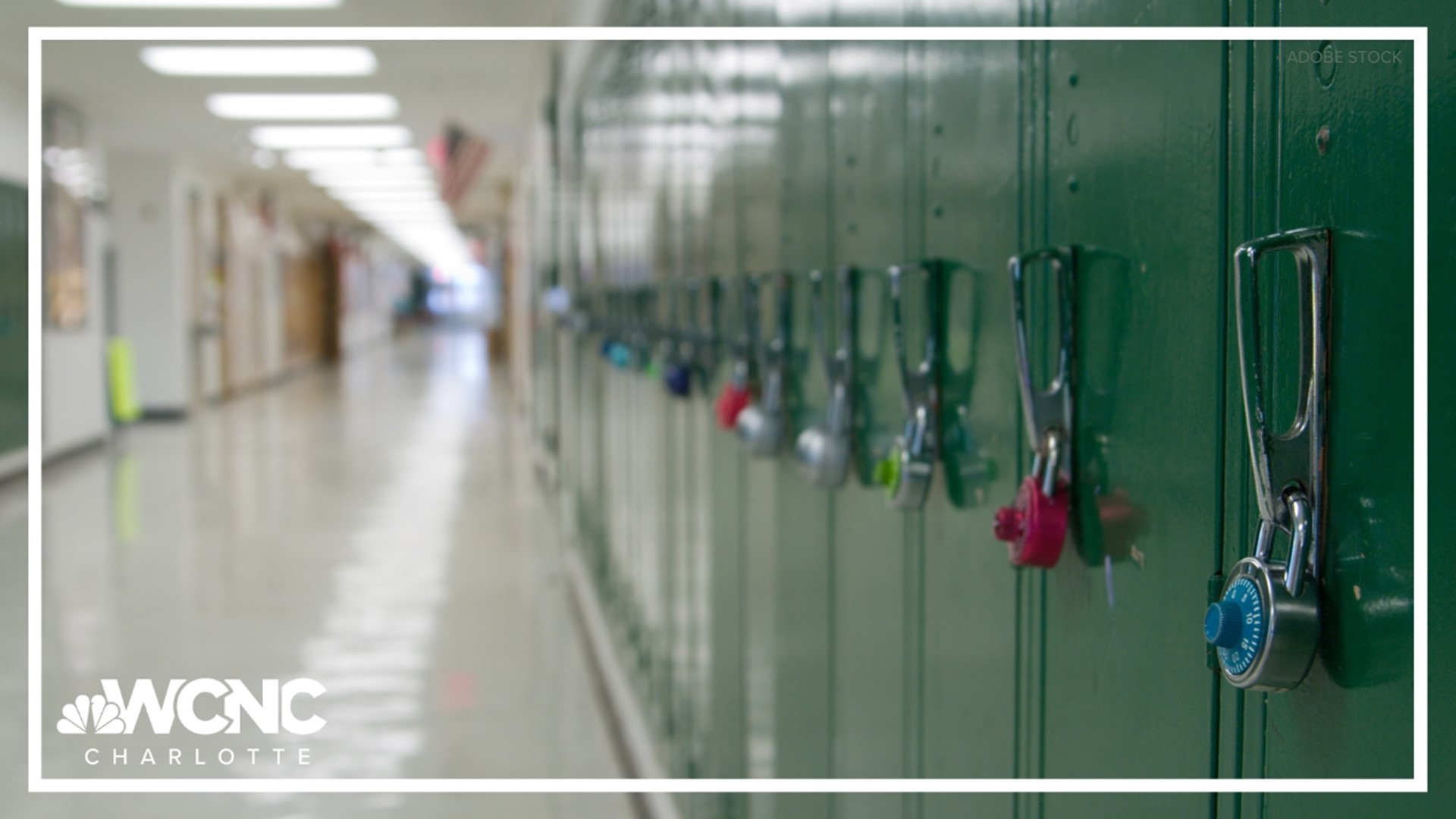CHARLOTTE, N.C. — New analysis released by the ACLU of North Carolina shows Black students are much more likely to be referred to law enforcement through school-based complaints than their white counterparts, particularly on charges of disorderly conduct in school.
The ACLU of North Carolina's report states North Carolina has failed to provide adequate mental health services, instead devoting more than $100 million to placing more police officers in more schools. Those officers have expansive discretion to decide which students are referred to the criminal legal system, leading to "dire consequences" for Black children and students with disabilities.
Black students are 2.4 times more likely to be referred to police than white students, while students with disabilities are 2.5 times more likely to be referred to police by schools than students without disabilities, the ACLU analysis explains.
A WCNC Charlotte investigation found North Carolina relies on lengthy exclusionary discipline for students with disabilities, revealing the Tar Heel State suspends and expels more students with disabilities than any other state, per capita.
Between 2017 and 2022, ACLU analysis shows law enforcement and school staff filed school-based complaints against Black students at three times the rate of their white counterparts, with Mecklenburg County being among the areas with the highest disparities.
From 2017 to 2023, schools in 25 counties referred only Black students for disorderly conduct. In 21 of those counties, Black students account for less than 50% of the population. Of 50 North Carolina counties that totaled 50 or more referrals, six did not refer any white students, despite Black students making up less than 50% of the student population in each of those counties.
The racial disparity was the worst in Gaston County, where Black students were referred to police for disorderly conduct at a rate 42 times more than white students. In Rowan and Iredell counties, Black students were 17.4 and 11.9 times more likely to be referred to the police.
The report said the presence of police officers converts typical childhood behaviors that would otherwise be handled by teachers, administrators, and parents into criminal offenses.
"Most immediately, schools can stop, and insist that their students are not charged for things like disorderly conduct in schools that can be handled with existing processes in practice," Sarah Hinger, Senior Staff Attorney at the ACLU Racial Justice Program, said.
The report calls for repealing a North Carolina law dealing with school-based conduct.
The law states that it's a crime to "disrupt, disturb or interfere with the teaching of students at any public or private educational institution or engages in conduct which disturbs the peace, order or discipline at any public or private educational institution or on the grounds adjacent."
This law applies to students.
When looking at the two largest districts in the state, CMS and Wake County Schools, CMS reports more Black students to law enforcement, but more Black students are arrested in Wake County.
This is according to data from the 2021-2020 school report cards from the North Carolina Department of Public Instruction.
The data shows both districts have a disproportionate rate of Black students referred to and arrested by law enforcement when compared to all students.
The criminal justice system interacting with students of color is a topic current CMS board members have previously discussed.
"I keep saying and repeating this, that the school-to-prison pipeline is a theory, but it's real, it starts in the schools, the high suspension of Black boys, and then from this, it leads to the dropout rate, dropout rate leads you to the criminal justice system," CMS Board Member Dee Rankin told WCNC Charlotte in March.
Rankin's comments came after a report showed that statewide, CMS had the most short-term suspensions and Black students made up the overwhelming majority of suspensions.
The ACLU recommends that schools statewide should put greater emphasis on providing better health and well-being services, including counselors, psychologists, nurses and social workers.
"What we want to see is our schools more closely connected and integrated with supportive services for students," Hinger said.
What can be done?
North Carolina was recently ranked No. 42 out of 50 states for overall youth mental health, the report states. The ACLU recommends schools statewide should put a greater emphasis on providing better health and well-being services, including counselors, psychologists, nurses and social workers.
The American Counselor Association recommends a ratio of 250 students per counselor, but data shows North Carolina schools average 361 students per counselor.
Numbers are even worse when it comes to social workers, who are capable of intervening to assist students who help students facing poverty, substance abuse, bullying and anger management.
The School Social Work Association recommends one social worker for every 250 students, yet data analyzed by the ACLU shows there is only one social worker for every 1,653 students in North Carolina and the report states nearly half of schools statewide reported not having a single social worker on staff.
In recent years, school districts have been adding school resource officers to their campuses to help with safety and security. In successful examples, those officers can also act as a counselor and confidant for students.
Contact Shamarria Morrison at smorrison@wcnc.com and follow her on Facebook, X and Instagram.
WCNC Charlotte is committed to reporting on the issues facing the communities we serve. We tell the stories of people working to solve persistent social problems. We examine how problems can be solved or addressed to improve the quality of life and make a positive difference. WCNC Charlotte is seeking solutions for you. Send your tips or questions to newstips@wcnc.com.

